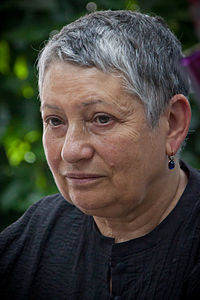Lyudmila Ulitskaya
| Lyudmila Ulitskaya | |
|---|---|
 |
|
| Born |
February 21, 1943 Davlekanovo, Russian SFSR, Soviet Union |
| Alma mater | Moscow State University |
| Genre | Fiction, script writing |
| Literary movement | Aestheticism |
| Notable works |
Sonechka The Funeral Party Medea and Her Children Daniel Stein, Interpreter |
| Website | |
| www |
|
Lyudmila Evgenyevna Ulitskaya (Russian: Людмила Евгеньевна Улицкая, born February 21, 1943) is an internationally acclaimed modern Russian novelist and short-story writer who, in 2014, was awarded the prestigious Austrian State Prize for European Literature for her oeuvre. In 2006 she published Daniel Stein, Interpreter (Даниэль Штайн, переводчик), a novel dealing with the Holocaust and the need for reconciliation between Judaism, Christianity, and Islam. Ulitskaya herself belongs to a group of people formed by the realities of the former Soviet Union, who see themselves ethnically and culturally as Jews, while having adopted Christianity as their religion.
Ulitskaya was born in the town of Davlekanovo in Bashkiria and grew up in Moscow where she received a degree in genetics from the Moscow State University. Having worked in the field of genetics and biochemistry, Ulitskaya began her literary career by joining the Jewish drama theatre as a literary consultant. Her first published short fiction appeared in 1990. Today, Lyudmila Ulitskaya divides her time between Moscow and Israel.
In her fiction, Ulitskaya seemingly describes and observes her characters at an equal distance from each one. Rather than going in for character development or delving into the tortured workings of her characters’ psyches otherwise perceived as the hallmark of Russian writing, Ulitskaya favors capsule descriptions, though she acknowledges that her characters are tortured. Generally speaking, she makes little use of dialogue. Masha Gessen, in her tribute article in The New Yorker in October 2014, finds that Ulitskaya's writing makes for compelling, addictive reading. Gessen reports that she was driven entirely by the desire to learn what happens next.
Among her interlinked themes are: the need for religious and ethnic tolerance; the problem of the intelligentsia in Soviet culture; how women shape new gender roles in society; and everyday life as a literary subject.
...
Wikipedia
